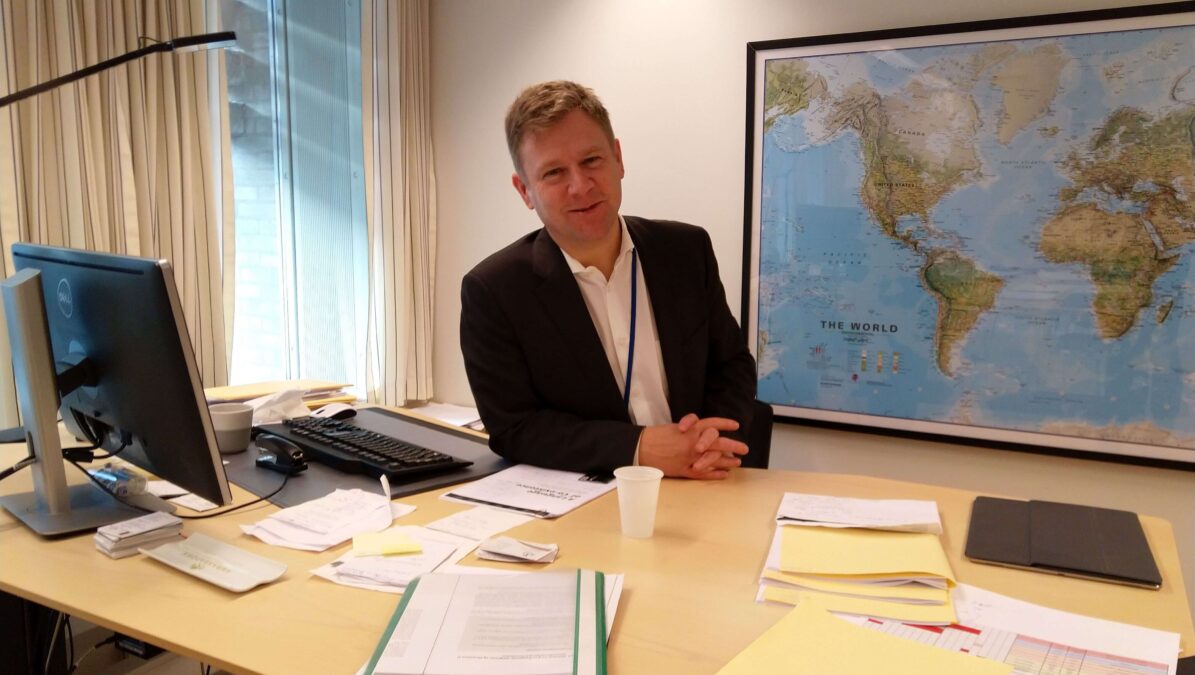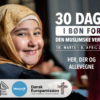Image: The idea is that I flow between different parts of the ministry that deal with aspects of this topic, says Michael Suhr.
The winter sun shines through the windows of the office at Asiatisk Plads at the Port of Copenhagen, where Michael Suhr welcomes you. He is the head of the unit within the Ministry of Foreign Affairs that is dedicated to promoting freedom of religion and belief, and here he gives an insight into the government's approach.
Your title is Ambassador, Special Representative for Freedom of Religion or Belief. What does this title mean?
The government wanted to appoint a representative of the minister who would signal to the outside world the increased importance attached to the promotion of freedom of religion and belief (FoRB (Freedom of Religion and Belief)). Denmark uses ambassadors for special functions, who are specially commissioned on issues it wants to promote. For example, the government has recently decided to also appoint a climate ambassador.
The idea is that I flow between different parts of the ministry that deal with aspects of this topic. I have a small unit to support me and will not build an organization within the organization, but will act as a catalyst for the area and create focus and promote the integration of efforts in the different areas where freedom of religion or belief can play a role. We must promote freedom of religion or belief externally, including for Christians in the world, but also internally, in terms of how we handle matters related to freedom of religion or belief in the ministry.
What tools does UM have in its toolboxwhich can it be used to help persecuted Christians?
Our focus is pluralistic on freedom of religion and belief, including the conditions of Christians. The starting point is Article 18 of the Human Rights Convention. The government has chosen a strategy consisting of 5 elements: 1) Mobilization of the international community, i.e. getting FoRB higher on the agenda so that FoRB is no longer a forgotten human right. This work is done through an informal international contact group of like-minded countries of both Christian and Muslim countries, but also through the EU; 2) Promote normative work under the auspices of the UN by going deeper into issues of interaction between FoRB and Gender equality and FoRB and Responsibility to Protect; 3) Participate actively in regional activities such as interfaith dialogues in the EU's neighboring countries, including the Middle East and North Africa; 4) Create new project work promoting FoRB in four countries: Egypt, Indonesia, Iran and Lebanon. 5) Select and seek to help 2-3 people who have gotten into difficulties because of FoRB.
In a number of countries, the most effective way to help Christians is to reach out to and work with moderate Muslims or other faith communities. Often this is also the approach that Christians in some of the countries we mostly talk about would prefer us to use, because their rights are best promoted through a moderate agenda in the countries where Christians are citizens. In some countries, Christians do not want to be singled out and thus stigmatized as a special minority.
How does reaching out to moderate Muslims help persecuted Christians?
The initiative is new, and it wasn't until the 2019 Finance Act that we received funding for specific projects. Now we need to start creating a framework for using the money together with civil society. But I personally believe that it should be defined by the NGOs themselves and that it is the ideas from civil society that should be used. The framework for using the money should be in place by the beginning of February.
In the past, I can see that something very sensible has come out of supporting, for example, an interfaith project that has sought to define common values in countries between Christians, Muslims and other faith communities. This can help to isolate extremist forces that do not respect the existence of common values in society, including respect for the right to freedom of religion and belief.
After the end of the Cold War, post-communist countries adopted constitutions that guaranteed citizens a number of freedoms. In recent years, many of these countries have turned their backs on Western values and have become more authoritarian. Furthermore, the West's dominance in the world is declining economically and politically. To what extent does the West, including the Ministry of Foreign Affairs in Denmark, still have the ability to influence these countries?
The international rules-based society is under pressure due to changing relations in the world. Prime Minister Lars Løkke Rasmussen has also emphasized this, and the government has put the issue on the agenda as one of the six most important topics for its new Foreign and Security Policy Strategy 2019-2020.
The West can still do a lot through existing multilateral organizations, including the UN Human Rights Council. Denmark has just become a member for the period 2019-21 and has made freedom of religion or belief one of its four top priorities. We will therefore also actively seek to influence developments through this work. In addition, there is an informal international contact group for the promotion of freedom of religion or belief, which has 23 members. These are not only Western countries, but also some Muslim-dominated countries such as Indonesia and Tunisia. The last country to join in October was Mongolia, which has also appointed an ambassador for freedom of religion or belief. "The group is completely informal, but we meet on the margins of the UN's biannual meetings in Geneva and New York. Denmark has chosen to contribute actively, for example by putting the interaction between FoRB and gender equality on the agenda.
The Western world does not dominate in the same way as before, but we will actively contribute to maintaining international rules-based cooperation. Michael Suhr
Yes, it is true that the Western world does not dominate in the same way as before, but we will actively contribute to maintaining international rules-based cooperation also in the FoRB area. We have an interest in this both morally, but also as a small country. Obviously, we have no interest in creating an old "them and us" division of the world into different religious areas. Therefore, it is important to involve moderate forces from different faith communities that want to participate in the cooperation, while at the same time having a special eye for the Christians' conditions given the Danish origin.
Leading up to Asia Bibi's acquittal in November required EU, that she was acquitted so that Pakistan could get a new trade agreement with the EU. Similarly, in June 2018, the US Senate had decided to ban Turkey from buying the newly developed F-35 Joint Striker fighter jets, citing the country's detention of American citizens, including Christian missionary Andrew Brunson. In August, the US increased'US President Donald Trump pressured Turkey to release its prisoners Brunson by doubling tariffs on steel and other products before he was released in October. Can trade policy be used to promote religious freedom?
The issue is high on the political agenda, and such tools, accompanied by ultimate demands, are used with great political symbolic value. Obviously, Denmark does not have the same opportunities, even if we wanted to, to use such ultimate tools. It is also worth remembering that our trade policy is created together with the soon to be 26 other countries in the EU, and only through the EU will trade policy instruments become relevant. The government's focus on the promotion of freedom of religion or belief in individual cases is good old-fashioned diplomacy.
Of course, there is great public interest in such spectacular cases, but most individual cases are probably best solved by being kept out of the public eye.
How can the Danish European Mission contribute to your work and that of the office?
We welcome your suggestions for projects in the priority countries. I hope we can work together in the future," concludes Michael Suhr.






